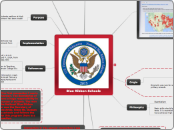por Bethany Gillum 12 anos atrás
343
Blue Ribbon Schools

por Bethany Gillum 12 anos atrás
343

Mais informações
The program I have researched about is the National Blue Ribbon School program. The purpose of the program is to publically recognize U.S. schools that have shown that their students have performed on high levels or have greatly improved. These schools serve as a model to other schools who may not have achieved as high as standards. The program was developed and thought about by the Secretary of Education of that time in 1981. Terrell H. Bell founded the program in 1982 in order to recognize schools where students thrive, and to address a Nation at Risk in its education. Originally, the award was just for secondary schools, but later expanded to primary schools as well. In 2003, the program was restructured in order to fit the No Child Left Behind Law placing a strong emphasis on state assessment such as STARR, and academic success. In 2012, the program was renamed the National Blue Ribbon School program instead of the Blue Ribbon School due to another business awarding blue ribbons. The program has implemented an award to over 7,000 American schools from Kindergarten- 12th grade. They have done so in a diverse amount of American schools such as, urban, suburban, rural, non-public schools, charter schools, magnet schools, and public schools. It’s a program that can improve businesses, award teachers and parents, and therefore reenergize the whole school in knowing that their efforts are not being over looked. The program is Essentialist. It is teacher directed, and known for rewarding schools that have succeeded in their students performing the basic skills assessed through state tests. The program looks at the core subjects of math, reading, social studies, and science. From those core subjects the program looks at the basic skills that are needed in order to succeed later in life, as our text book describes in Chapter 5. A Nation at Risk is actually an essentialist view, and a public report addressing the reform efforts for essentialist philosophers. It is their philosophy that the schools are given a responsibility of public service, and therefore should be given an award when succeeding at doing so. They hope that these model schools will in turn share their practices with other schools so that they can be successful as well.